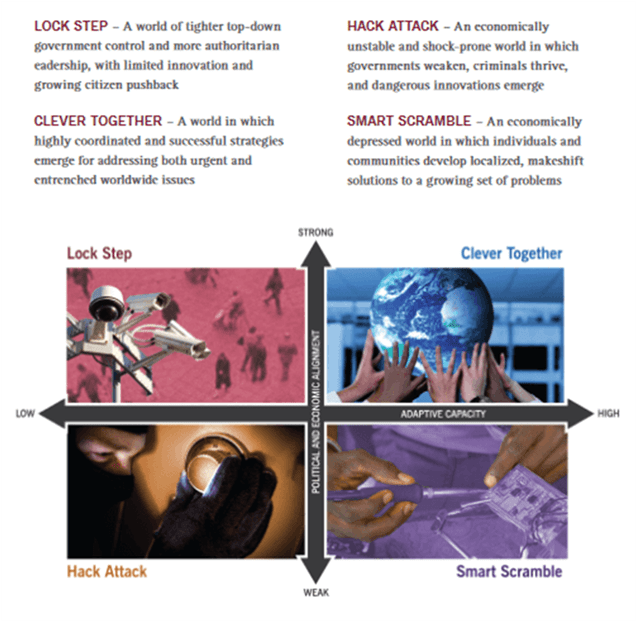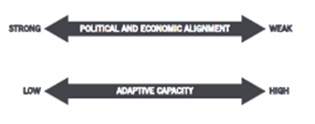Scenarios For The Future Of Technology and International Development, a 2010 Rockefeller Foundation Report that Holds its Ground in the Pandemic
May 22, 2020, Kathmandu
Scenarios for the Future of Technology and International Development is a document that comes from the Rockefeller Foundation. It has existed since 1913 with the mission to promote the well-being of humanity. It seeks to identify and accelerate breakthrough solutions and ideas to solve global challenges – similar to what the world is facing right now with the wake of COVID-19 pandemic.
Technology has always shaped and revolutionized the globe. For Rockefeller, there was no doubt that it could address a wide range of development changes in the future.
Read More on How Technology Can Fight the Coronavirus Pandemic
The study by the Rockefeller Foundation involved choosing a timeframe of 15 to 20 years. Then comes the building of scenarios that could possibly determine the technology that could shape the capacity of individuals, society, and the world. Moreover, it was important to visualize technologies of the future that could uplift the lives of vulnerable populations in the world.
Driving Forces Affecting the Scenario of Future Technology and International Development
Based on interviews and secondary researches, the foundation chose two uncertainties that would define the four scenarios for future technology and international development. These uncertainties are rather divergent, challenging, internally consistent, and reasonable.
These are:
Political and Economic Alignment
The current scenario of the world pretty much defines this uncertainty. In fact, the outbreak of coronavirus pandemic has affected economic integration and political structures. The flow of goods, capital, movement of people, and their ideas have been affected.
Similarly, political structures play a vital role to determine how a nation faces a global challenge. It is not the same for all areas or nations.
On one end of this uncertainty axis, we would see stronger international relations and global collaborations to solve problems. Similarly, the global economy would be thriving with high trade volumes. At the other end of the axis, there lies the failure of collaboration and interconnected solutions to pressing global challenges. And, fragmentation of trade with downslide in the global economy.
Needless to say what end of the axis we are at currently. Most open-borders in the globe have been sealed and international flights are at hold. However, the demand for technology has crossed new levels with the need to stay connected while practicing ‘social distancing’.
Adaptive Capacity
Another uncertainty that affects the future of technology and international development is the capacity to cope with the change. Crisis demands adaptive capacity like managing existing systems or upgrade the systems and structures to meet the requirements.
It is extremely important to ensure resilience against external forces as well. For example, with the closure of educational institutes, how are the management, teachers, and students coping?
Obviously, some started providing online classes without any further delays – this is the proper use of resources that we have. However, to sustain it for years to come, we need to upgrade the infrastructures.
Present Scenarios for Technology Development
All nations may be experiencing different scenarios that the report from the Rockefeller Foundation presents. But one thing is for sure – the pandemic has opened doors for new opportunities in the field of technology.
With traveling prohibited and the majority of countries in lockdown, individuals and society are becoming more independent. The aftermath of the pandemic will also spark the need for limiting physical contact. So, most industries have already put their trust in the future of technology.
Tech companies are considering long-term remote work strategies while there are also a few that have crashed along with the economy. Every industry is realizing the importance of technology in tackling uncertain challenges and moving forward towards a sustainable future.
Meanwhile, cyberattacks are also emerging during the crisis. It’s majorly because of the lack of readiness to shift online and proper guidance.
Also Read: Will Coronavirus Lead To More Cyber Attacks?
Technological Shift in Nepal to Fight the Pandemic
There are several instances where the tech industry of Nepal has stepped up to fight the pandemic. Whether its spreading genuine information or implementing contingency measures – we are slowly but surely adapting to the changes.
The internet has become the eyes and ears for everyone in quarantine. With Nepal in lockdown, the telco industry and service providers are dealing with a surge in voice and internet traffic.
Similarly, the advancement in the world of distance learning has made it possible to run online classes. There are applications that facilitate live classes, examinations, assessments, and other activities if an institute chooses to go forward with a new modality.
However, the advancement in such technology becomes obsolete without the development of infrastructure. In the case of developing countries like Nepal, it creates a digital divide.
Find out how Telco and ICT sectors can support the Digital Nepal Movement of the Government.
Conclusion
Each scenario in the report leads to the adoption of different strategies. We can never be well-prepared for an unseen event but what matters is how fast we can adapt and fight the crisis.
While the scenarios are quite different, but the common factor is the need for innovation that shapes future technology. With the provision of technology and its features, another pressing issue that needs to be addressed is its availability.
So, what we need is a better understanding of the impact of technology on development so that each individual can benefit from it. When that becomes possible, we can see the world advancing in a positive direction.
You May Also Like: Nepal Budget 2077/78: Online Education and Telco Development









